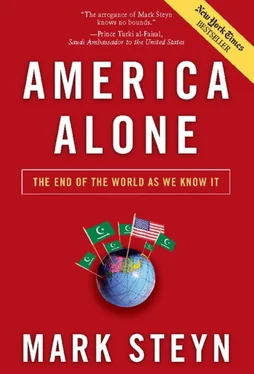I know what he means. In 2005 I chanced to see a selection of images from the Miss Shemale World celebrations outside Toronto’s City Hall. And what struck me was not that “shemales” should want to have a big ol’ parade showing off their outsized implants — each to her own, even if in this case her own were purchased from Dow Corning. No, what seemed more pertinent was that the local government should think Miss Shemale World is an event that requires municipal approval. Of course, if they hadn’t approved, they would have been guilty of being “non-inclusive.” John O’Sullivan isn’t saying Canadian men are literally crossdressers — certainly no more than 35, 40 percent, and me only on weekends — but nonetheless a once manly nation has undergone a remarkable psychological makeover. In 1945, the Royal Canadian Navy had the third-largest surface fleet in the world; the Royal Canadian Air Force was one of the most effective air forces in the world; Canadian troops got the toughest beach on D-Day. But in the space of two generations, a bunch of tough hombres were transformed into a thoroughly feminized culture that prioritizes the secondary impulses of society — rights and entitlements from cradle to grave — over all the primary ones. In that, Canada’s not alone. If the O’Sullivan thesis is flawed, it’s only because the Lumberjack Song could also stand as the postwar history of almost the entire developed world. To understand why the West seems so weak in the face of a laughably primitive enemy it’s necessary to examine the wholesale transformation undergone by almost every advanced nation since World War Two. Today, in your typical election campaign, the political platforms of at least one party in the United States and pretty much every party in the rest of the West are all but exclusively about those secondary impulses: government health care (which America is slouching toward, incrementally but remorselessly), government day care (which was supposedly the most important issue in the 2006 Canadian election), government paternity leave (which Britain has introduced). We’ve elevated the secondary impulses over the primary ones: national defense, self-reliance, family, and, most basic of all, reproductive activity. If you don’t “go forth and multiply” you can’t afford all those secondary-impulse programs, like lifelong welfare, whose costs are multiplying a lot faster than you are. Most of the secondary-impulse stuff falls under the broad category of self-gratification issues: we want the state to take our elderly relatives off our hands not so much because it’s better for them, but because otherwise the old coots would cut seriously into our own time. Fair enough. But once you decide you can do without grandparents, it’s not such a stretch to decide you can do without grandchildren.
I’ve always loved Lincoln’s allusion to the “mystic chords of memory” because it conveys beautifully the layers of a healthy society: the top notes — the melody line, the tune — are the present, but the underlying harmony is critical, too; it places the present in the context of history and eternal truths, and thereby binds us not just to the past but commits us to the future, too. Yet since 1945, throughout the West, a variety of government interventions-state pensions, subsidized higher education, higher taxes to pay for everything — has so ruptured traditional patterns of inter-generational solidarity that Continentals now exist almost entirely in a present-tense culture of complete self-absorption. In the end, the primal impulses are the ones that count. Robert Kagan’s observation that Americans are from Mars, Europeans are from Venus doesn’t quite cover it. The Lumberjack Song and the Shemale World get closer: we’re Martians who think we can cross-dress as Venusians and everything will be all right. And like some of the hotter-looking transsexuals on display at Toronto’s City Hall, the modern Western democracy is perfectly feminized in every respect except its ability to reproduce.
Americans don’t always appreciate how far gone down this path the rest of the developed world is: in Continental cabinets, the defense ministry is now somewhere an ambitious politician passes through on his way up to important jobs like the health department. I don’t think Donald Rumsfeld would regard it as a promotion to be moved to Health and Human Services. Yet the secondary impulses are so advanced that most of America’s allies no longer share the same understanding of basic words like “power.” In 2002 Finnish prime minister Paavo Lipponen gave a speech in London saying that “the EU must not develop into a military superpower but must become a great power that will not take up arms at any occasion in order to defend its own interests.” No doubt it sounds better in Finnish. Nonetheless, he means it: for many Europeans, the old rules no longer apply. They’ve been supplanted by new measures of power, like how smoothly you fit in at the transnational yakfests (EU, UN, ICC, etc.). Yet in the long run this redefinition of the state is killing them. As Gerald Ford used to say when trying to ingratiate himself with conservative audiences, “A government big enough to give you everything you want is big enough to take away everything you have.” And that’s true. But there’s an intermediate stage: a government big enough to give you everything you want isn’t big enough to get you to give any of it back.
That’s the position European governments find themselves in. Their citizens have become hooked on unaffordable levels of social programs which in the end will put those countries out of business. Just to get the Social Security debate in perspective, projected public pensions liabilities are expected to rise by 2040 to about 6.8 percent of GDP in the United States. In Greece, the figure is 25 percent — i.e., total societal collapse. So what? shrug the voters. I paid my taxes, I want my benefits.
This is the paradox of “social democracy.” When you demand lower taxes and less government, you’re damned by the Left as “selfish.” And, to be honest, in my case that’s true. I’m glad to find a town road at the bottom of my driveway in the morning, and I’m happy to pay for the Army and a new fire truck for a volunteer fire department every now and then, but, other than that, I’d like to keep everything I earn and spend it on my priorities.
The Left, for its part, offers an appeal to moral virtue: it’s better to pay more in taxes and to share the burdens as a community. It’s kinder, gentler, more compassionate, more equitable. Unfortunately, as recent European election results demonstrate, nothing makes a citizen more selfish than socially equitable communitarianism: once a fellow’s enjoying the fruits of government health care and all the rest, he couldn’t give a hoot about the general societal interest; he’s got his, and if it’s going to bankrupt the state a generation hence, well, as long as they can keep the checks coming till he’s dead, it’s fine by him. “Social democracy” is, it turns out, explicitly anti-social. To modify Polybius, it’s “avarice” dressed up with “pretentiousness.” And it leads, in Europe and elsewhere, to societal “indolence.” Somewhere along the way these countries redefined the relationship between government and citizen into something closer to pusher and addict. And once you’ve done that, it’s very hard to persuade the addict to cut back his habit. Thus, the general acceptance everywhere but America is that the state should run your health care. A citizen of an advanced democracy expects to be able to choose from dozens of breakfast cereals at the supermarket, hundreds of movies at the video store, and millions of porno sites on the Internet, but when it comes to life-or-death decisions about his own body he’s happy to have the choice taken out of his hands and given to the government.
Читать дальше












